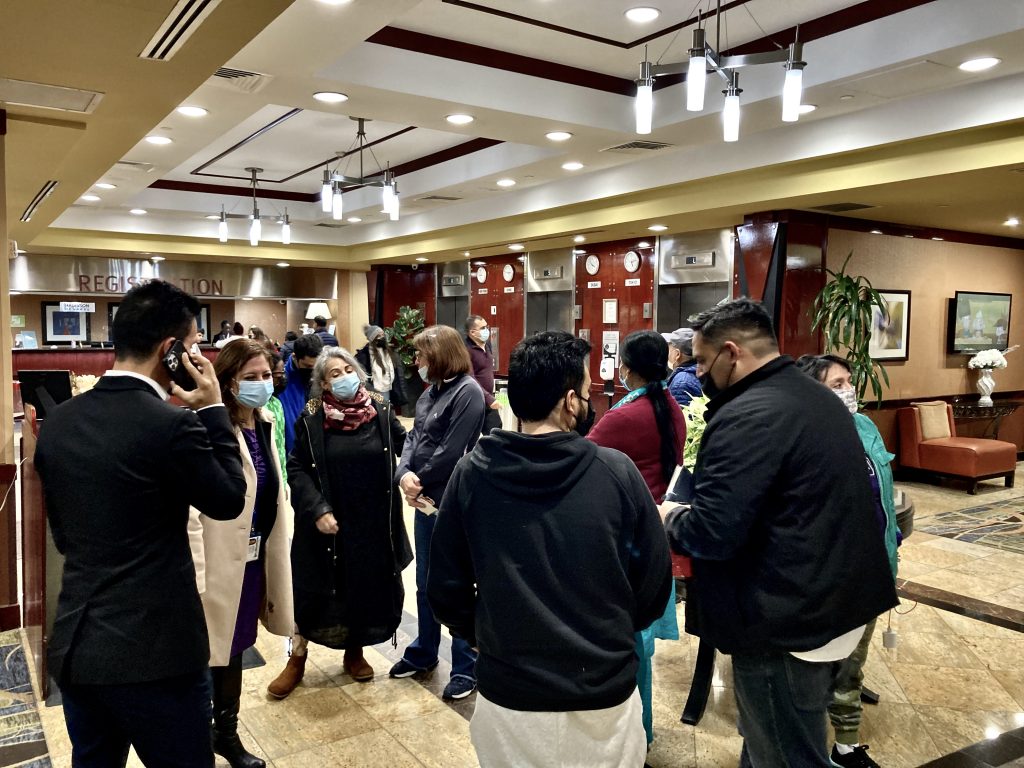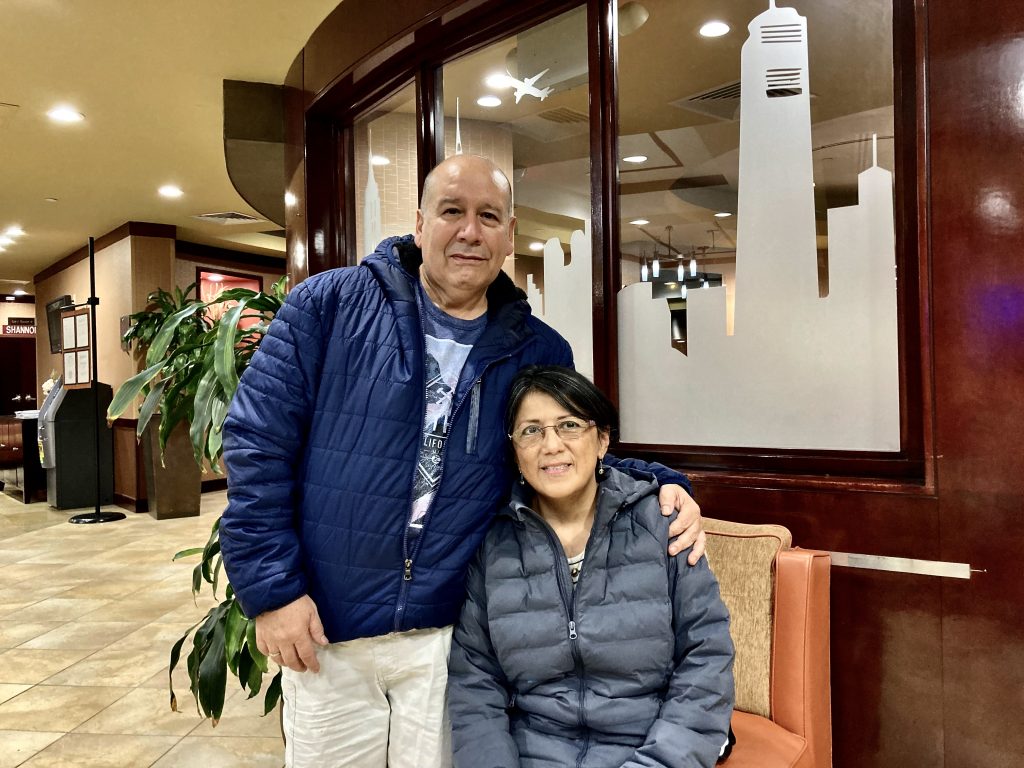On Monday night, management at the Radisson Hotel near JFK Airport attempted to evict about a dozen guests who have been living at the hotel since early September. Their homes were destroyed by Hurricane Ida.
Nacy Peco, one of the guests, who is battling breast cancer, left her room only to return to find her key was not working. Frail and weak with hunger, she was forced for hours to wait in the lobby in her pajamas until she could be let back in.
“I need my medication for my cancer,” she said. “I’m too tired.”
Since Hurricane Ida devastated mostly working-class immigrant communities on September 1st, killing 45 people in the metro region, about 20 families have become climate change refugees and have been forced to call the Radisson home.
Many of the residents were displaced from their homes in Western Queens and almost all lived in first-floor or basement apartments. Many of the guests say the Department of Housing Preservation and Development (HPD) sent them letters informing them that they would have to check in to shelters in Downtown Brooklyn just days before they were kicked out of their hotel rooms.
Louis Paz, the manager of the hotel, claimed that their intention was never to push anyone into the streets but added that the fate of the guests is the responsibility of the City, which is paying for the rooms through HPD.
“I’m just waiting for whatever agency is in charge of extending the reservations,” he told Documented. “That’s pretty much it. We are just the hotel. Everything else I’m not sure”
Single mother Eileen Bendoyro, 52, lost everything when her East Elmhurst basement apartment flooded during Hurricane Ida. She and her 13-year-old son barely made it out with their lives. Since September 8th, she and her son have been living at the Radisson. It was much farther from where she lived, but Bendoyro was able to get her son, who has special needs, to his school in Long Island City.
Given her living situation, Bendoyro had to quit her job as a teaching assistant to care for her son full time after the storm. When she got word last Friday that she would have to move, Bendoyro was livid.
“We are good here,” says Bendoyro. “We want to stay here because it’s close to school for my kid. Other people have jobs that are close in Queens. I don’t know why HPD says we are going to Brooklyn.”
Assemblymember Jessica González-Rojas, who represents many of the displaced guets, was on site to help facilitate the situation.
Also read: Organizations Serving Immigrants in New York

“I’m working and trying to navigate the city agencies that are involved and unfortunately it’s a bureaucratic patchwork of nightmares,” she said. “I understand the convenience that would provide for the City however that actually moves our neighbors out of their communities really far. They’re already far from their community.”
Sandro Navarro, district director for State Senator Jessica Ramos was also present. Ramos’ office was working all day with city officials to try to prevent the guests from having to be shipped to Brooklyn.
“Many of these families are senior citizens, one has cancer, they have children, one is a newborn and one is special needs,” he said. “It’s not convenient for them. They have their doctors here, they have their schools here. For the City to send them to downtown Brooklyn it’s not in the best interests of the people.”
Also Read: Renters of Basement Apartments Fear Claiming Hurricane Ida Aid
Bibiane Chamorro, a 54-years-old Flushing resident from Colombia, and her husband Mario Gamino, 60, from Mexico, were opposed to the prospect of moving into a shelter in Brooklyn. Both housekeepers in Queens, they could not bear to make the daily commute from Brooklyn.
“Why do they want to put us in a shelter? We are not homeless,” said Gamino. “We want to stay here.”
For 12 years, they lived in the same basement apartment in Flushing with their pet cockapoo. They paid $1,200 a month in rent. It was the most they could afford. At around 8:00 p.m. on September 1, they went to bed only to be awakened by the barking of their dog.
“When I woke up the water was above my ankles,” said Gamino. “I woke up my wife and told her we are flooding and we have to get out of here.”
A heavy sleeper, when Chamorro realized the severity of the situation the apartment was already halfway flooded due to Hurricane Ida.
“My husband screamed at me and said grab whatever you can, the house is flooding,” said Chamorro. “Then he said let go of everything we are going to die.”

Also read: Health Care Access for Immigrants in New York
Within minutes the apartment was completely flooded and their heads were touching the ceiling. Chamorro hit her head in the doorway and began bleeding. As they swam out Chamorro realized they forgot the dog and went back for it. By then the apartment was completely flooded and she couldn’t get back out
“I’m a good swimmer but the problem was I had to battle all these other objects blocking my way. I cut myself around my chest and I just couldn’t move.”
Fearful for his wife, the 60-year-old Gamino dove back into the apartment and saved his wife. Miraculously the dog was able to find a way out and escaped on its own. However, Chamorro swallowed a lot of the water that was mixed with raw sewage and had to be hospitalized overnight after getting severely ill.
After she recovered, it was only then they could take stock of the situation they were now in.
“The next day we were in trouble,” Chamorro said. “I couldn’t believe it, we lost everything. I cried all day.”
Her husband agreed.
“It was terrible. We lived there for 12 years and we lost a life of 12 years.”
Now they only hope they will be able to stay at the Radisson only until they get back on their feet.
“We are from Flushing,” says Gamino. “We work in Queens. It’s better for us here.”
Assemblymember Rojas points out that the lack of truly affordable housing that is available in the borough is exacerbating the crisis that Ida has already presented. She believes that this is a wake-up call for the city.
“We need a long-term solution in Western Queens,” she says. “We don’t have emergency housing in Western Queens, which is surprising because we have tons of hotels near Laguardia Airport … I’m not sure why there is a gap there and why they would be sent to JFK.”
With the hours spent in the lobby mounting, at around 9:30, the guests were finally informed that they were allowed back into their rooms. With the help of Senator Ramos and Assemblymember Rojas, HPD granted the guests a one-night exception. Yet, in terms of what would become of their long-term fate, it was still left up in the air.
Also read: FASTEN: Rental Assistance for Tenants Facing Housing Insecurity in New Yorks
In a statement to Documented, HPD declined to go into specifics regarding the guests at the Radisson but agreed to speak only in generalizations.
“The City has provided more than 380 families with emergency housing since Hurricane Ida hit in September, and we’ve deployed every resource available to get them back into permanent housing,” said Anthony Proia, HPD’s Vice President of Communications. “We’ve secured extended stays in hotels in downtown Brooklyn for many of those who remain in our care, and will continue to work with the families staying at hotels in Queens to get them back on their feet.”
On Tuesday, Maria Bolanos, representing the Mayor’s Office of Community Affairs, told Documented that the Mayor in coordination with New York City Emergency Management was able to extend the guests stay at the Radisson for another 6 nights. Bolanos declined to discuss any long-term solutions for the displaced Ida victims.
As for Bibiane Chamorro and Mario Gamino, they try to build upon whatever is left of their lives, they find it difficult to move on living in a state of limbo. They hope, with FEMA money, they will have enough to move into new apartments in December. Still, despite all they have gone through, they stay strong for each other.
“It’s very difficult to start over but what’s most important is that we are alive and we are together,” says Gamino with a smile.
Chamorro’s face lights up with joy and her eyes, glued to him. She replies: “He’s my hero.”





